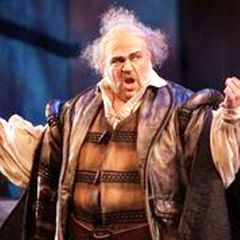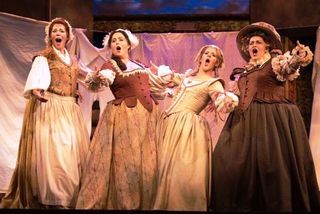|
Back
Shakespeare Without Biers Philadelphia
Wilmington, DE (The Grand Opera House)
05/15/2016 - & May 21, 2016
Giuseppe Verdi: Falstaff
Steven Condy (Sir John Falstaff), Sean Anderson (Ford), Victoria Cannizzo (Alice Ford), Sharin Apostolou (Nannetta), Maariana Vikse (Meg Page), Ann McMahon Quintero (Mistress Quickly), Ryan MacPherson (Fenton), Jeffrey Halili (Dr. Caius), Jeremy Blossey (Bardolfo), Matthew Curran (Pistola)
Wilmington Children Chorus, Kimberly Doucette(Children’s Chorus Master), OperaDelaware Chorus, Jeffrey Miller (Chorus Master), OperaDelaware Orchestra, Giovanni Reggioli (Conductor)
Dean Anthony (Stage Director), Peter Tupitza (Set Designer), Driscoll Otto (Lighting Designer, Projection Designer)

S. Condy (© Joe Del Tufo/Moonloop Photography)
“Comparisons,” said Shakespeare’s Dogbury, “are odorous.” But comparing the Saturday evening’s Amleto of OperaDelaware’s Shakespeare Festival with Sunday afternoon’s Falstaff is all too enlightening.
Franco Fracci’s Amleto did credit to the 71-year-old opera company, in that it held the East Coast premiere of a 19th Century opera, conducted by the man who uncovered it. Alas, the rarity of the opera and the gusto of the production was confounded by the paucity of the music and the immaturity of Arrigo Boito’s treatment of the Bard.
Compare Amleto with Falstaff. Rather, don’t compare it, for nothing is comparable to this, the climax of both Verdi and Boito, the transcendence of opera buffa itself,. Not a comic opera, but a Divine comedy, composed by a man who had been known for everything but a sense of humor.
Add this to a production by OperaDelaware which was elegant, charming, a quicksilver enchantment which would do credit to any opera house.
Previous productions of Falstaff I have seen try oh so hard to give it more meaning than Verdi and Boito intended. The Falstaff character has been cruel, nasty, a man defeated by life, left to wallow in his own lard. True enough, in Shakespeare’s depiction of Falstaff, we have a character more multilayered than his stomach, a man who has lost the love of his royal pal, who dies in shame. The best production here was Orson Welles’ Chimes At Midnight, showing the very tragic almost sympathetic Sir John.
But this was not what Boito was aiming at. He was aiming at Falstaff as the trickster and the tricked, he was showing the males as also tricksters and tricked. And he showed the four women, those Merry Wives of Windsor, as charming, smart, delightful–and as conspiratorial as the men!
I once asked conductor James Levine what single opera he would take on a desert island, and he immediately said, Così fan tutte. Mozart’s opera was the equivalent of Verdi’s Falstaff, and it was played that way.
We had, in fact, in Steven Condy a Falstaff who was incisive and witty, not a mere caricature. His improvised trick of sending a letter to two ladies was perhaps crude, but in his singing, Mr. Condy wanted us to believe that it was a good trick, one worthy not only of his mind but a fitting tribute to the world’s lack of honor.
This was a role which demands more acting than singing. (The Delaware audience started to applaud after an eight-bar aria, but soon realized that it was more Wagnerian story than Italian opera.) Mr. Condy played it to the hilt–but not as cartoon. He was fat and ungainly, yes. But we knew this more from the “merry wives” insults than the eponymous star.

M. Vikse, V. Cannizzo, S. Apostolou, A. McMahon Quintero
(© Joe del Tufo/Moonloop)
Against him where those four ladies. They were charming, harmonious, more cunning that Falstaff, taking as much pleasure in their deceptions than Sir John in his. While they were all good, Ann McMahon Quintero’s Mistress Quickly was the most adept actor. Her glances, her gestures, the changing timbres, and above all, her savoring of the drama–what immortal delight was in her “Reverenza” curtsy– were played with all the delicacy they deserved.
I must repeat that, while voices are always important in Verdi, Falstaff has actions which oft overcome the voices. In this production, nobody was strident, over-dramatic: all the cast were part of an ensemble playing. Thus, Sean Anderson was a very proper (correctly stiff) Mr. Ford, his semi-arias pushing the action forward. Dr. Caius, with a comic-book fake nose, was played with sobriety by Jeffrey Hall. As for Jeremy Blossey and Matthew Curran as Bardolfo and Pistola, they were both awkward, drunk, funny and vocally adept.
Of course the two lovers, Sharin Apostolou and Ryan MacPherson, were squeaky-clean, the pretty ingenue, the handsome hero–though both Boito and Verdi made certain their lulling arias weren’t as interesting as the opera buffa itself.
I say ”opera buffa”, but Verdi made certain this was not light Rossini-style opera. Eschewing any arias (bel canto or vocal), Verdi paired up action with melody. And while that challenge, to give sudden physical movements while singing, has destroyed many a production, here director Dean Anthony offered a more gentle production. We actually liked all of these characters, we enjoyed equally the conspirators and supposed victims. The children of the last scene were less ghouls than real children having a good time.
As for the last music, this, to me, was the crowning jewel of Verdi’s music. The same double-part fugue which he offered in the Requiem’s “Sanctus” he now gave to eight characters. So subtle is this fugue, so much part of the music itself, that few listeners even realize the musical intricacies rival Bach at his most complex.
Confessedly, I inevitably cry during those luscious moments. Usually it’s for the music. In OperaDelaware’s Falstaff, I cried because I was so happy that the characters were so forgiving of each other, that they understood, that they smiled and laughed their own absurdity.
Falstaff can be played with satire, with cruelty, with burlesque. Director Dean Anthony played it with gentleness, even (what several folk told me on the visit to Wilmington) the traditional Delaware-style equanimity. In this, he made not only the opera a wonderful experience, but gave deference to Shakespeare’s own unfailing humanity.
Harry Rolnick
|